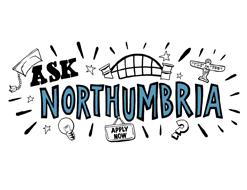-
Study
-
Quick Links
- Course Search
- Fees and Funding
- Unlock Your Potential
- Still time to Apply
- Higher and Degree Apprenticeships
- Continuing Professional Development
- Still time to apply
-
Undergraduate
- Application Guides
- UCAS Exhibitions
- Foundation Years
- School & College Outreach
- Information for Parents
-
Postgraduate
- Application Guide
- Postgraduate Research Degrees
- Flexible Learning
- Change Direction
- Register your Interest
-
-
International
International
Northumbria’s global footprint touches every continent across the world, through our global partnerships across 17 institutions in 10 countries, to our 277,000 strong alumni community and 150 recruitment partners – we prepare our students for the challenges of tomorrow. Discover more about how to join Northumbria’s global family or our partnerships.
View our Global Footprint-
Quick Links
- Course Search
- Undergraduate Study
- Postgraduate Study
- Information for Parents
- London Campus
- Northumbria Pathway
- Cost of Living
- Sign up for Information
-
International Students
- Information for Students
- International Events
- Application Guide
- Entry Requirements and Education Country Agents
- Global Offices
- English Requirements
- English Language Centre
- International student support
- Cost of Living
-
International Fees and Funding
- International Undergraduate Fees
- International Undergraduate Funding
- International Masters Fees
- International Masters Funding
- International Postgraduate Research Fees
- International Postgraduate Research Funding
-
International Partners
- Agent and Representative Network
- Global Partnerships
- Global Community
-
International Mobility
- Information for Northumbria Students
- Information for Incoming Exchange Students
-
-
Business
Business
The world is changing faster than ever before. The future is there to be won by organisations who find ways to turn today's possibilities into tomorrows competitive edge. In a connected world, collaboration can be the key to success.
More on our Business Services -
Research
Research
Northumbria is a research-rich, business-focused, professional university with a global reputation for academic quality. We conduct ground-breaking research that is responsive to the science & technology, health & well being, economic and social and arts & cultural needs for the communities
Discover more about our Research -
About Us
-
About Northumbria
- Our Strategy
- Our Staff
- Place and Partnerships
- Leadership & Governance
- Academic Departments
- University Services
- History of Northumbria
- Contact us
- Online Shop
-
-
Alumni
Alumni
Northumbria University is renowned for the calibre of its business-ready graduates. Our alumni network has over 246,000 graduates based in 178 countries worldwide in a range of sectors, our alumni are making a real impact on the world.
Our Alumni - Work For Us
What will I learn on this module?
This module is designed for students with some experience in creative writing to further develop their skills in prose and/or poetry, with an emphasis of producing longer pieces of writing. The module will examine the nature of genre, and will explore structure in the novel, novella, short story cycle, long poem and poetic sequence.
Although the focus of the module is on your own writing, we will read and discuss a number of texts in order to improve technique and help you in planning and carrying out your project.
Seminars will run as creative writing workshops in which students respond to writing exercises and learn to offer and receive feedback on their own and others’ work.
How will I learn on this module?
You will attend and participate in two weekly 1.5-hour seminars. Initially these will be tutor-led, introducing and analysing texts, carrying out exercises and planning and beginning creative projects.
Later sessions will be given over to workshopping student work-in-progress.
In the seminars you will read and analyse the work of others, carry out writing exercises, and workshop each other’s ongoing writing projects.
However, at Level 6 the main impetus of your work must come from you: independent writing and study will form the main learning activity, and you must conceive, plan and drive forward your own writing project for this module. It is your opportunity to design and carry out your own piece of creative writing, putting into practice the techniques you have acquired on the degree so far.
You are strongly advised to keep a reflective diary over the course of the module. Alongside your notebooks and drafts, it will provide a record of your thinking, learning and writing processes, and help you to develop your project effectively. It will also provide a foundation for the reflective commentary which you are required to submit as part of your final assessment for the module. The commentary should not simply be the diary, but should draw on it to help you reflect on your creative practice.
How will I be supported academically on this module?
Feedback on summative work will be delivered according to the existing protocols of the Department of Humanities, with comments on feedback sheets. Formative feedback will be provided in the workshops.
Plans for the portfolio will be discussed in advance with tutors, in order to determine that they are appropriate. A draft version of the assessment may be submitted for feedback before the submission of the assessment in its final form
Assignments will be processed through the Turnitin Plagiarism Detection software via Blackboard. Turnitin will help improve referencing skills and help avoid plagiarism.
Further guidance will be made available via Blackboard, from your seminar tutor, and in lectures.
What will I be expected to read on this module?
All modules at Northumbria include a range of reading materials that students are expected to engage with. Online reading lists (provided after enrolment) give you access to your reading material for your modules. The Library works in partnership with your module tutors to ensure you have access to the material that you need.
What will I be expected to achieve?
Knowledge & Understanding:
Learn how to
1. Understand the nature and production of creative writing as practice-led research
2. To critically examine longer pieces of fiction and the theoretical and practical processes that go into their writing
Intellectual / Professional skills & abilities:
3. To demonstrate skill in the writing of prose fiction and/or poetry
4. Develop a framework for applying skills of editing, revision and critiquing of creative writing texts
Personal Values Attributes (Global / Cultural awareness, Ethics, Curiosity) (PVA):
5. An ethical approach to creative composition and reflection
How will I be assessed?
Formative assessment will be provided by tutor and peer assessment of draft work in seminars.
Summative assessment is in the form of a Portfolio of prose fiction made up of:
3,500 words of prose (either part of a novel/novella or one or two short stories in a short story cycle), or poetry totalling 120 lines (MLO 3, 4)
with a 500-word critical commentary (MLO 1, 2, 5)
A single mark is given, based on the literary merit of the creative component, and on the extent to which it applies ideas learned in the module, as evidenced by the commentary.
Feedback on summative work will be provided using the Departmental template and comments on the script.
Pre-requisite(s)
NA
Co-requisite(s)
NA
Module abstract
N/A
Course info
UCAS Code QW38
Credits 20
Level of Study Undergraduate
Mode of Study 3 years Full Time or 4 years with a placement (sandwich)/study abroad
Department Humanities
Location City Campus, Northumbria University
City Newcastle
Start September 2025 or September 2026
All information is accurate at the time of sharing.
Full time Courses are primarily delivered via on-campus face to face learning but could include elements of online learning. Most courses run as planned and as promoted on our website and via our marketing materials, but if there are any substantial changes (as determined by the Competition and Markets Authority) to a course or there is the potential that course may be withdrawn, we will notify all affected applicants as soon as possible with advice and guidance regarding their options. It is also important to be aware that optional modules listed on course pages may be subject to change depending on uptake numbers each year.
Contact time is subject to increase or decrease in line with possible restrictions imposed by the government or the University in the interest of maintaining the health and safety and wellbeing of students, staff, and visitors if this is deemed necessary in future.
Useful Links
Find out about our distinctive approach at
www.northumbria.ac.uk/exp
Admissions Terms and Conditions
northumbria.ac.uk/terms
Fees and Funding
northumbria.ac.uk/fees
Admissions Policy
northumbria.ac.uk/adpolicy
Admissions Complaints Policy
northumbria.ac.uk/complaints













